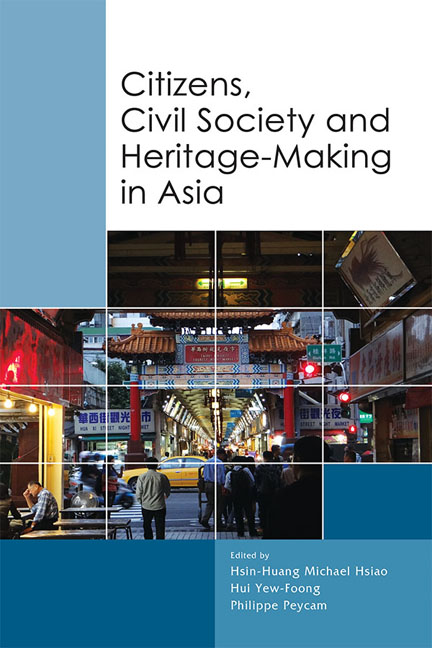Book contents
- Frontmatter
- Contents
- Contributors
- 1 Introduction: Finding the Grain of Heritage Politics
- 2 Heritage, Identity and Power
- 3 Heritage-Making and Post-coloniality in Yangon, Myanmar
- 4 Living Heritage of Ruins? Contesting the Paradox in Trowulan's Majapahit Heritage
- 5 The Reconstruction of Heritage in Rural Vietnam: An Analysis of State and Local Dynamics
- 6 Performing Cultures, Negotiating Identities: The Cultural Politics of Indigenous Cultural Villages in West Malaysia
- 7 Constituting Philippine Filmic and Linguistic Heritage: The Case of Filipino Regional Films
- 8 Encounter and Counter-Narratives of Heritage in Macau
- 9 Cultural Activities of the Chinese Community in Post-war Myanmar
- 10 Chinese Street Opera in Singapore: Heritage or a Vanishing Trade
- 11 Policy Formation and Civil Society Engagement in Heritage-Making in Taiwan: A Historical Examination
- 12 Becoming Taiwanese: Appropriation of Japanese Colonial Sites and Structures in Cultural Heritage-Making — A Case Study on the Wushantou Reservoir and Hatta Yoichi
- 13 Defining Culture in the Heritage Preservation of Taiwanese Veterans’ Villages: The Case of Zuoying
- 14 Tobacco Crop Memories in Taiwan: The Heritage of a Deadly Agriculture
- Index
5 - The Reconstruction of Heritage in Rural Vietnam: An Analysis of State and Local Dynamics
Published online by Cambridge University Press: 03 January 2018
- Frontmatter
- Contents
- Contributors
- 1 Introduction: Finding the Grain of Heritage Politics
- 2 Heritage, Identity and Power
- 3 Heritage-Making and Post-coloniality in Yangon, Myanmar
- 4 Living Heritage of Ruins? Contesting the Paradox in Trowulan's Majapahit Heritage
- 5 The Reconstruction of Heritage in Rural Vietnam: An Analysis of State and Local Dynamics
- 6 Performing Cultures, Negotiating Identities: The Cultural Politics of Indigenous Cultural Villages in West Malaysia
- 7 Constituting Philippine Filmic and Linguistic Heritage: The Case of Filipino Regional Films
- 8 Encounter and Counter-Narratives of Heritage in Macau
- 9 Cultural Activities of the Chinese Community in Post-war Myanmar
- 10 Chinese Street Opera in Singapore: Heritage or a Vanishing Trade
- 11 Policy Formation and Civil Society Engagement in Heritage-Making in Taiwan: A Historical Examination
- 12 Becoming Taiwanese: Appropriation of Japanese Colonial Sites and Structures in Cultural Heritage-Making — A Case Study on the Wushantou Reservoir and Hatta Yoichi
- 13 Defining Culture in the Heritage Preservation of Taiwanese Veterans’ Villages: The Case of Zuoying
- 14 Tobacco Crop Memories in Taiwan: The Heritage of a Deadly Agriculture
- Index
Summary
We have lived not only in the era of globalization but also in the age of heritagization. More and more sites and activities have been officially designated as tangible or intangible heritage, from the local level to the international. Many scholars have attributed the making and remaking of heritage, both tangible and intangible, to globalization and state policies, specifically to the impact of the accelerating international tourist flow as well as to state efforts to shape distinctive national identities and to attract international tourists through cultural-historical heritage.
International research on the remaking of heritage in Vietnam — which has focused on major tourist attractions like UNESCO-designated heritage sites in Huế and Hội An — has similarly emphasized the impact of global forces and state policies (see Long 2003 and Salemink 2007 regarding the Huế festival). Vietnamese research has strongly centred on state policy issues, such as how to maintain or to manage heritage in the context of globalization and urbanization (Trương Thin 1993; Bui Hoai Sơn 2009; Đặng văn Bai 2012). However, in numerous localities throughout Vietnam, heritage is being made and remade far from the domestic and international tourist gaze, and with little state support. In this chapter, I suggest that local networks and regionally varying community dynamics play at least as an important role as global forces and state policies in the making and remaking of tangible and intangible heritage in Vietnam.
Focusing on rural/semi-rural festivals normally linked to sacred spaces in particular localities, I analyse why the revival of festivals as intangible heritage is much stronger in the Red River delta of northern Vietnam than elsewhere in the country. According to 2006 statistics from the Department of Community Culture (Vietnamese Ministry of Culture, Sports and Tourism), the Red River delta, although home to only 21.6 per cent of the Vietnamese population, witnessed the celebration of 3,650 festivals (46 per cent of all festivals in Vietnam in 2006). The Mekong delta of southern Vietnam, with 20.7 per cent of the Vietnamese population, had only 1,234 festivals (15 per cent of all festivals in Vietnam that year). Of the two main metropolitan areas in Vietnam, Hanoi had 1,097 festivals (14 per cent) while Hồ Chi Minh City, despite having a larger population, had only 91 festivals (1.1 per cent; see appendix).
- Type
- Chapter
- Information
- Citizens, Civil Society and Heritage-Making in Asia , pp. 86 - 113Publisher: ISEAS–Yusof Ishak InstitutePrint publication year: 2017



